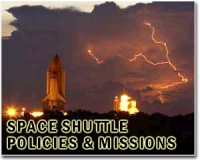 |
Boston MA (SPX) Apr 13, 2011 Thirty years ago, on April 12, 1981, the U.S. Space Shuttle made its first voyage into space. Four years later, on the same date, rookie astronaut Jeffrey Hoffman made the first of his five flights as a shuttle astronaut. MIT News asked Hoffman, now Professor of the Practice of Astronautics at MIT, to reflect on the shuttle's history and influence. Q. Now that the U.S. Space Shuttle's career is ending, how would you say it stacks up against any other space vehicles so far, or currently on the drawing boards, and what have been the shuttle's greatest accomplishments? A. The shuttle is the most versatile spaceship ever built. It has launched satellites, repaired satellites in orbit, conducted scientific experiments of great complexity (especially with the Spacelab module), serviced the Hubble Space Telescope to repair failures and upgrade the instrumentation so that it remains a state of the art telescope, and enabled the construction of the International Space Station. It was never designed, nor is it able, to go beyond low Earth orbit. It is more expensive to operate and flies less frequently than was originally hoped, and it is not nearly as robust as many other spacecraft - in other words, if it departs only slightly from its normal operating envelope, a disaster can ensue. With the shuttle, we have learned to operate in low Earth orbit at a level of sophistication unimaginable in pre-shuttle days. Its greatest accomplishment is probably to demonstrate the feasibility of a reusable spacecraft. Also, as a winged vehicle, the shuttle has given us valuable knowledge about hypersonic flight. The shuttle's most unique moment was probably its first flight, which was the first time (and very likely the last for the foreseeable future) that humans had ever ridden a rocket on its very first mission, with no unmanned test flights. The initial rescue/repair of Hubble was the most complex mission ever attempted with the Shuttle and demonstrated the ability of space-suited astronauts to do precision work during spacewalks. The continued servicing of Hubble is arguably the shuttle's most enduring contribution to science. And, of course, the legacy of the shuttle is the International Space Station, which was designed to be launched and assembled using the shuttle. Q. What are your hopes for the U.S. manned space program after the shuttle - would this be a really bad time to want to be an astronaut? A. NASA's human space flight activities will be concentrated for at least the next decade on the International Space Station, which now has to be transformed from a construction project into a working scientific laboratory. I hope that the commercial launch industry will deliver on the hoped-for systems to provide the U.S. with access to low-Earth orbit, so that we do not remain dependent on the Russians. A real commercial human launch industry would be a game-changer for our country's human space flight activities. Hopefully, this will allow NASA to concentrate on exploration beyond the Earth, which is what I would like to see NASA doing, rather than just running a taxi service to the ISS. Astronauts these days will not have as many flights as we did during the heyday of the shuttle, and they may have to wait a lot longer. However, if the ISS turns out to produce interesting science, they will be in the middle of this, which should be interesting. Q. After 50 years of humans in space, what surprises you most about where we are today compared to what you might have expected in the early years? A. After Apollo, everyone inside the space community expected us to continue to bigger and greater things, like exploring Mars. It took a long time to appreciate how unique a time Apollo was, and how unlikely it is that such circumstances will repeat. So we need to learn to explore space on a much more constrained budget. I also find it frustrating that our government cannot seem to support the development and testing of a new human spacecraft while we are flying the current one. This happened at the end of Apollo and is now happening again at the end of the shuttle era.
Share This Article With Planet Earth
Related Links MIT Shuttle at NASA Watch NASA TV via Space.TV Space Shuttle News at Space-Travel.Com
 Retiring space shuttles go to four US museums
Retiring space shuttles go to four US museumsWashington (AFP) April 12, 2011 Thirty years after the first space flight of the US shuttle program, NASA announced Tuesday the three retiring orbiters will take up residence as museum pieces in Florida, Virginia and California. NASA's declaration sparked anger in Texas, the home of mission control in Houston, and one senator from the state of Ohio, the birthplace of American airplane flight, demanded a federal probe into ... read more |
|
| The content herein, unless otherwise known to be public domain, are Copyright 1995-2010 - SpaceDaily. AFP and UPI Wire Stories are copyright Agence France-Presse and United Press International. ESA Portal Reports are copyright European Space Agency. All NASA sourced material is public domain. Additional copyrights may apply in whole or part to other bona fide parties. Advertising does not imply endorsement,agreement or approval of any opinions, statements or information provided by SpaceDaily on any Web page published or hosted by SpaceDaily. Privacy Statement |